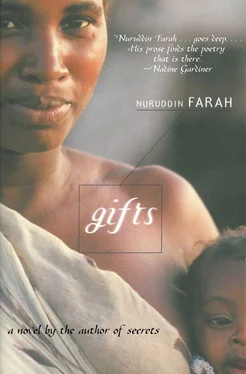Nuruddin Farah - Gifts
Здесь есть возможность читать онлайн «Nuruddin Farah - Gifts» весь текст электронной книги совершенно бесплатно (целиком полную версию без сокращений). В некоторых случаях можно слушать аудио, скачать через торрент в формате fb2 и присутствует краткое содержание. Год выпуска: 2011, Издательство: Arcade Publishing, Жанр: Современная проза, на английском языке. Описание произведения, (предисловие) а так же отзывы посетителей доступны на портале библиотеки ЛибКат.
- Название:Gifts
- Автор:
- Издательство:Arcade Publishing
- Жанр:
- Год:2011
- ISBN:нет данных
- Рейтинг книги:3 / 5. Голосов: 1
-
Избранное:Добавить в избранное
- Отзывы:
-
Ваша оценка:
- 60
- 1
- 2
- 3
- 4
- 5
Gifts: краткое содержание, описание и аннотация
Предлагаем к чтению аннотацию, описание, краткое содержание или предисловие (зависит от того, что написал сам автор книги «Gifts»). Если вы не нашли необходимую информацию о книге — напишите в комментариях, мы постараемся отыскать её.
Gifts — читать онлайн бесплатно полную книгу (весь текст) целиком
Ниже представлен текст книги, разбитый по страницам. Система сохранения места последней прочитанной страницы, позволяет с удобством читать онлайн бесплатно книгу «Gifts», без необходимости каждый раз заново искать на чём Вы остановились. Поставьте закладку, и сможете в любой момент перейти на страницу, на которой закончили чтение.
Интервал:
Закладка:
The bill settled, the waiter left, Duniya wondered if Bosaaso had been generous with the tip.
Silent, they took turns rinsing their fingers in the warm water the waiter had brought for that purpose. In the half-dark, she thought that Bosaaso was smiling like someone about to make a mischievous remark. She has the calm confidence to wait, and he the good breeding not to interrupt her eating.
“If Zawadi had said yes, I would have married her,” he said.
Duniya took a deep breath, but said nothing.
They ate in silence, Duniya affecting disinterest in the reasons why Zawadi wouldn’t marry him. She took care not to munch noisily, lest this interfered with their quiet thinking. Once or twice, their fingers collided, and each apologized to the other. When this happened a few more times Duniya chuckled. Bosaaso went on, “Basically, Zawadi mistrusted men as husbands, not as lovers, or even platonic friends. She loathed being taken for granted, which, she said, was how black men behaved, no matter where in the world they lived, the USA, Africa, the West Indies, men who considered women their rightful property. Some of the black men she knew came into a woman’s place with their flies bulging with unfulfilled lust. It was as though they were entering a urinal, she would say, their trouser fronts undone, at the ready, prepared for action.”
He gave himself time to eat a morsel in silence.
“Will you tell me how someone like Kaahin has entered your life?” she asked. “It seems to me that he doesn’t belong in your years of childhood spent in the town G. Or does he?”
“Zawadi brought him into my life.”
“How’s that?”
“In one of her community work projects, Zawadi stumbled upon Kaahin, living in a commune off Harlem, with no papers authorizing him to be in the US, and not doing what he had gone to do, take a degree. She took him into her able social worker’s hands and within a year he was straightened out, capable of going back to Harvard.”
Duniya said with feeling, “What an amazing woman, this Zawadi.”
“She is a gift. You should meet her.”
They fell silent, both thinking that Zawadi and Duniya would get along splendidly.
Then Duniya said, “What I don’t understand, after all this, is why Zawadi is not here, living with you or paying you occasional visits. Surely there’s the Afro-American myth and wish on the part of many of them to return to their mother-continent. Or did you discourage her from joining you?”
“On the contrary. When Mire came to pay us a visit in New York and he and I began toying with the idea of returning home and volunteering our services, Zawadi made encouraging remarks about the project we were embarking on, that’s all. Of course she was only too ecstatic for us, but she wouldn’t come. It was she who contacted Kaahin, convincing him that his lot lay with ours.”
“All this remains a mystery to me,” she confessed.
“Zawadi quoted a variation of an English proverb, giving it a slight twist: ‘It is at home that charity is bred like a stallion of Arabian nobility.’ She urged that there was no point to her coming to Africa to do volunteer work when her home-grown people, the Blacks in the USA, needed her just as desperately ‘Besides,’ she added, ‘Africa is not ready for my Black American way of life, and I am too old to unlearn all I’ve learned.’ But she promised that one day she would pay Africa a deserved visit.”
Neither spoke for a good while, and they ate quietly and selfconsciously When both had eaten enough, each helped the other to wash and rinse their hands by holding the soap, giving the towel and pouring out the water.
Anxious, their conversation travelled no further than immediate, mundane questions responded to with short answers. Somehow Abshir’s name came into their talk, and Bosaaso remembered that a friend of his was leaving for Rome on the Somali Airlines flight in a couple of days. Would she want him to carry Abshir’s letter?
“Let’s find out if Miski is on that flight,” suggested Duniya, “because she has always been our courier and she and Abshir have an established way of reaching each other.”
BRUSSELS (AFP/REUTER)
After economic and political pressures (and no doubt some delicate negotiations), the European Community has finally imposed its mighty will on the Ethiopian President Mengistu Haile Mariam by making him accept that a team of EC officials oversee the distribution of food aid in the country’s northern provinces of Tigray and Eritrea. The Ethiopian government has communicated its acceptance of these conditions to the EC Development Commissioner based in Addis Ababa. The European Community has been preoccupied over the possibility that food aid might not reach the two northern rebel-held provinces. Preparations are presently under way for the team to fly to Addis Ababa.
To date, the Community has granted food aid worth 260 million dollars. In addition, it has also given some long-term development aid amounting to about 100 million dollars for the Marxist-led government of Ethiopia to carry out reforms in its land and agricultural policies.
13
In which Duniya is given her first driving lesson.
A woman lay asleep in the scanty shade of a fig tree, dreaming. She heard a weak whistle, that of a kestrel, then the shrill cry of a kite calling her name, a call she refused to respond to. When the woman imagined that the hawk had tired of shouting her name, she opened her eyes and to her amazement saw a hat drop from the clutch of the kestrel’s claws, a hat which she caught with her alert hands. When next the hawk spoke her name, the woman prepared to get up, but couldn’t bring herself to do so, given that she was absolutely naked. Again the kestrel’s claws let go another surprise gift, this time a garland of leaves, thus providing her with something to cover her embarrassment with. That done, the woman rose to her feet, putting on the hat, too.
But the woman was on a footpath going south towards a marshland. With the sleepy look of a dreamer, she spotted the figure of a man in an upright position, a man dwelling within the confines of a pearl-shaped framework of wires serving as a cage. Further ahead, there was a three-storey house with a large fruit garden surrounding it. Rather suddenly, the hawk chanted its message, “Befriend me, Woman, and I will be yours for ever; have faith in me and I will give you what is due to you.”
Frightened, the woman let go both the hat and garland of leaves, upon which she now trod. The hawk’s cries ceased, night became day: and the woman woke up.
Duniya and Bosaaso met later that day in front of the hospital. It was a little after two in the afternoon. One could see how much they had looked forward to their reunion, having been separated by sleep as well as work. They had had a serious talk about what Duniya referred to as her family’s total dependence on Bosaaso’s lift-offering generosity something that would have had to come to a stop sooner or later. They had arrived at an alternative arrangement mutually acceptable to both: from tomorrow morning, Bosaaso’s cousin’s taxi would take Nasiiba and Yarey to and from their respective schools, in return for a token sum to be paid by Duniya monthly She was content, the children were, and so was Bosaaso.
They were in his car now and he was driving her home. “And how has your day been?” he asked.
“It’s been difficult,” she said, leaning forward and buckling up, a must for any passenger in Bosaaso’s vehicle. She was incapable of putting on her safety-belt, but nevertheless kept up the attempt.
He helped her with it, and both were conscious of their hands touching. “Mine has been nothing but meeting after meeting after boring meeting without us achieving anything,” he said.
Читать дальшеИнтервал:
Закладка:
Похожие книги на «Gifts»
Представляем Вашему вниманию похожие книги на «Gifts» списком для выбора. Мы отобрали схожую по названию и смыслу литературу в надежде предоставить читателям больше вариантов отыскать новые, интересные, ещё непрочитанные произведения.
Обсуждение, отзывы о книге «Gifts» и просто собственные мнения читателей. Оставьте ваши комментарии, напишите, что Вы думаете о произведении, его смысле или главных героях. Укажите что конкретно понравилось, а что нет, и почему Вы так считаете.











